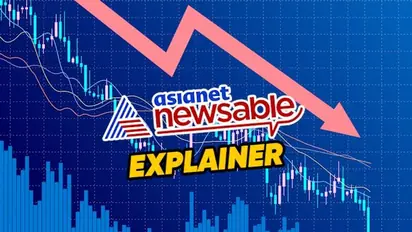Profit booking, Covid sub-variant JN.1 concerns & more: Why Indian markets plunged in just 3 hours

Synopsis
The article explores the unexpected sharp decline in Indian equity markets, analyzing factors such as profit booking, Covid concerns, geopolitical tensions, historical patterns, and market indicators, while highlighting experts' perspectives on potential opportunities and the market's future trajectory.
In a surprising turn of events, Indian equity benchmark indices, BSE Sensex and Nifty50, witnessed a sharp decline of over 1 percent in a single trading session after reaching lifetime highs on Wednesday. This abrupt shift in market sentiment left traders and investors puzzled, considering the positive global and domestic cues. The BSE Sensex, after touching a new record near 72,000, fell over 1,000 points, dropping below the 71,000 mark, with Nifty tumbling nearly 300 points.
The sudden change in market sentiment caught participants off guard, particularly in the face of favorable global and domestic indicators. Despite positive trends, such as a 1.5 percent increase in Japan's Nikkei 225 and a 1 percent rise in London's FTSE 100, both the BSE Sensex and Nifty50 experienced a surprising decline. Notably, US bond yields saw a significant drop, and Brent crude oil prices remained below the $80 mark.
Also read: Year Ender 2023: 10 jaw-dropping world records broken by Indians this year
Experts examining valuation parameters and technical indicators suggest an imminent consolidation following a prolonged market rally. Exploring the potential reasons behind the downturn, we identify five factors that contributed to the decline of the BSE Sensex and Nifty50 on Wednesday.
Profit Booking and Stretched Valuations
The steep fall in the market was primarily attributed to profit booking at higher levels, according to Sanjeev Hota, Head of Research at Sharekhan by BNP Paribas. Investors opted to take profits, especially in mid- and small-cap stocks, where valuations were perceived as stretched following a significant run-up. Vinod Nair, Head of Research at Geojit Financial Services, echoed similar sentiments, stating that profit-booking intensified due to stretched valuations in mid and small-cap stocks after a rapid rally.
Impact of Covid Sub-Variant JN.1
Rising cases of the Covid sub-variant JN.1 in India became a focal point, garnering market attention. Concerns about the potential impact of this variant on public health and the rise in COVID-19 cases prompted profit-booking, particularly in the pharma sector. Sanjeev Hota told TOI these concerns as one of the possible reasons for the sharp market crash.
Geo-Political Tensions
Sanjeev Hota also pointed out concerns over potential geo-political tension, particularly related to shipping routes in the Red Sea region due to Houthi militias from Yemen. These geopolitical uncertainties have dampened investor sentiments and contributed to the sudden and sharp sell-off in the market.
Historical Data Analysis
Historical data analysis from the last five years in December reveals a pattern where positive periods were followed by corrections or consolidations. Analysts, including Anand James, Chief Market Strategist at Geojit Financial Services, anticipate a decline and subsequent consolidation before election sentiments gather pace. The historical pattern suggests a decline through the remainder of December, followed by a consolidation phase.
Also read: Explained: Is JN.1 sub variant of Covid-19 a cause of concern?
Market Cap to GDP Ratio Concerns
Analysts caution about potential overvaluation, particularly in small and microcap segments with steep valuations. The Buffett Indicator, measuring market cap to GDP ratio, raises concerns about potential market overvaluation, leading to anticipated volatility.
While concerns about overvaluation, historical patterns, and geopolitical tensions contribute to the market correction, some experts remain optimistic about India's structural story. Sanjeev Hota emphasizes that despite the recent dip, India's stable government, healthy corporate earnings outlook, and improving macro picture could provide investment opportunities in quality stocks. Traders are advised caution, with a focus on index majors and high-quality stocks, along with strict adherence to stop-loss measures, especially in the midcap and smallcap sectors. The market's reaction in the coming weeks will provide further insights into the sustainability of the recent correction.
Stay updated with all the latest Business News, including market trends, Share Market News, stock updates, taxation, IPOs, banking, finance, real estate, savings, and investments. Track daily Gold Price changes, updates on DA Hike, and the latest developments on the 8th Pay Commission. Get in-depth analysis, expert opinions, and real-time updates to make informed financial decisions. Download the Asianet News Official App from the Android Play Store and iPhone App Store to stay ahead in business.